Highlights from the Medicine and Life Sciences Research Communities
Published in Healthcare & Nursing, Microbiology, and General & Internal Medicine

April was a significant month for international awareness days, including World Health Day and World Malaria Day. Below, you’ll find summaries of a small selection of the amazing blogs posted on the Research Communities in efforts to raise awareness for these days. I encourage you to read them in full and explore the many other posts that highlight the wide range of awareness events observed throughout April.
World Health Day 2025
World Health Day is observed annually on April 7th and serves to raise global awareness about specific health topics and to improve public health. Each year, the World Health Organization (WHO) selects a particular theme that highlights a priority area of concern. This year, the theme is ‘Healthy beginnings, hopeful futures’, urging governments and the health community to ramp up efforts to end preventable maternal and newborn deaths, and to prioritise women’s longer-term health and well-being.
Below are posts from the Research Communities, highlighted in recognition of World Health Day 2025, which cover the topics of women’s health and strengthening health systems worldwide.
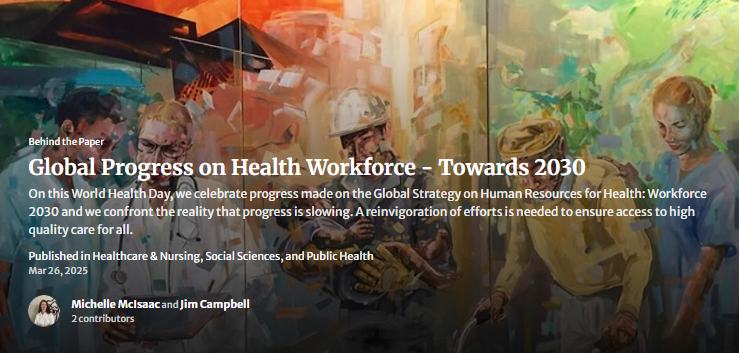
Global progress on health workforce - a key WHO initiative to strengthen health systems worldwide
In this Behind the Paper post expanding on the paper published in Human Resources for Health , @Michelle McIsaac and @Jim Campbell reflect on the progress and challenges of the ‘Global strategy on human resources for health: Workforce 2030’, a key WHO initiative to strengthen health systems worldwide. This post highlights critical actions needed to protect the workforce, maintain investment, and foster partnerships for public good. Read more to understand the urgent steps needed to secure a resilient, equitable health workforce, and how you can get involved in building a hopeful future.
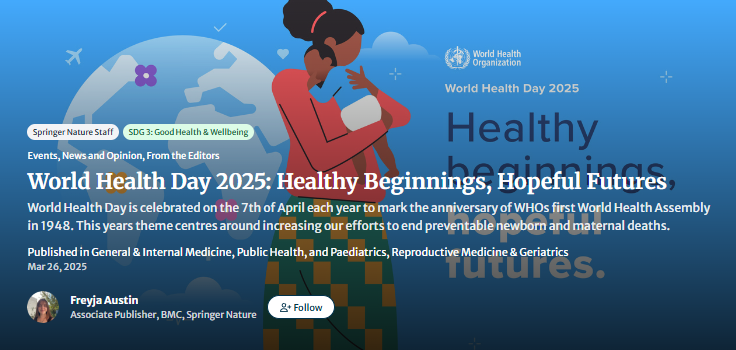
Highlighting Springer Nature content relating to World Health Day 2025
This excellent post from @Freyja Austin highlights the urgent need to improve maternal and newborn health. The post links these goals to the UN’s Sustainable Development targets and offers a selection of resources, including webinars, research collections, and expert insights. It’s a powerful reminder of the work still needed, and a guide for how researchers, policymakers, and advocates can help drive meaningful change. Read the whole post here.
World Malaria Day 2025
Malaria is a life-threatening disease caused by infection with Plasmodium parasites, transmitted to humans through the bites of female Anopheles mosquitoes. World Malaria Day 2025 on the 25th of April 2025 highlights the theme ‘Malaria Ends With Us: Reinvest, Reimagine, Reignite’. This aims to reinvigorate efforts of combating the disease at all levels, from global policymaking to grassroots initiatives, and accelerating the drive towards ending malaria for good.
Read the following posts that explore various aspects of malaria, its global impact, and the ongoing efforts to combat the disease.
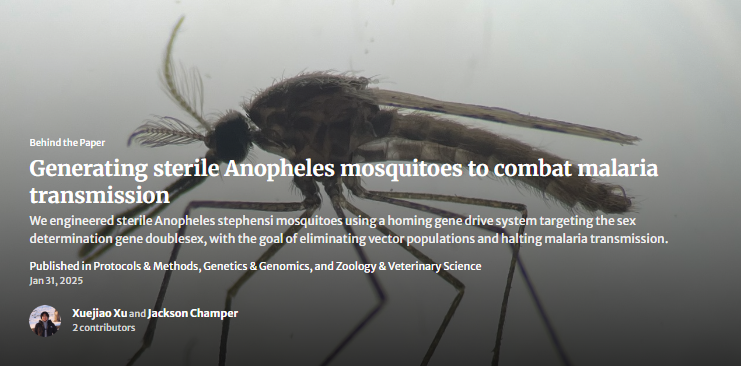
Can gene drives turn the tide against malaria?
This Behind the Paper post by @Xuejiao Xu and @Jackson Champer explores a next-generation gene drive aiming to suppress mosquito populations more effectively and sustainably. The team, who published their work in Nature Communicatons, encountered surprising intersex outcomes and species-specific challenges, offering key insights into the complexities of gene editing. Excitingly, the study also points to promising strategies to reduce malaria resistance and improve control. Read the full post to uncover the breakthroughs and remaining hurdles.
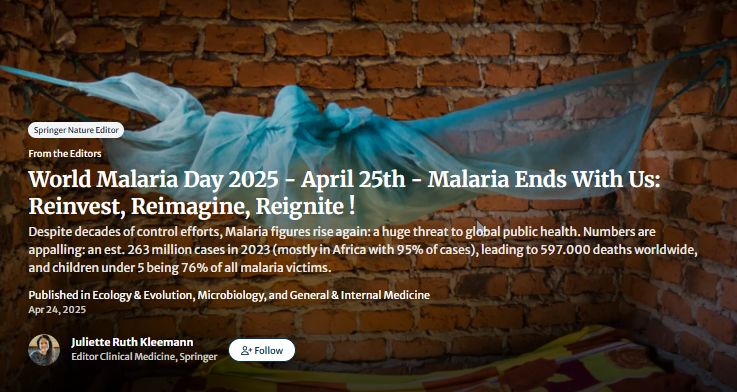
Calling attention to Springer Nature OA and hybrid content relating to malaria
Explore research from Springer Nature journals, highlighted by @Juliette Ruth Kleemann, on new vaccines, mosquito control strategies, diagnostics, and climate impact, aligned with the United Nation’s Sustainable Development Goal 3. Read more to find out how research, community action and policy innovation can help end malaria.
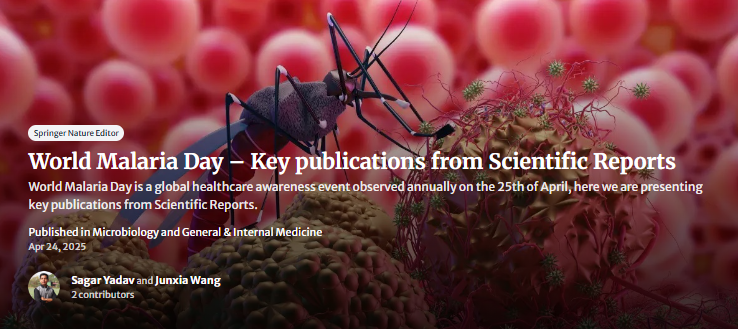
Key publications from Scientific Reports for World Malaria Day
From deep learning breakthroughs that detect malaria with 97% accuracy to skin microbiome research that could create new mosquito repellents, @Sagar Yadav and @Junxia Wang write about how scientists are reimagining prevention and treatment. Read more to discover cutting-edge research, global trends, and how open access science is driving real progress towards a malaria-free future, and why urgent action still matters.
It was World Autism Day on the 2nd of April which was a very fitting time to read the excellent Q&A with Gina Rippon on Autism in Women from India Sapsed-Foster, challenging outdated stereotypes and ensuring that both scientific and societal understanding of autism becomes more inclusive and representative of all individuals, regardless of gender. Her contributions to the field of neurodiversity and gender research offer a much needed correction to the historically skewed portrayal of autism.
And finally, make sure to read this excellent post on Stress Awareness Month by Danielle Yates, who shares a range of content from the BDJ Portfolio exploring how stress is experienced by both patients and professionals.
These highlighted blog posts from our authors demonstrate the knowledge, creativity, and collaboration that make the Communities truly special.
Don’t forget to like and start conversations in the comment section of the posts you enjoy. Is there more you would like to learn from the author? Let them know in their post’s comments!
Further reading:
- March highlights from Medicine and Life Sciences Research Communities
- Quarterly highlights from the Humanities and Social Sciences Communities
- Quarterly highlights from the Mathematics, Physical & Applied Sciences Communities
If you have any questions, get in touch with the team at communities@springernature.com.
Follow the Topic
-
Nature Communications

An open access, multidisciplinary journal dedicated to publishing high-quality research in all areas of the biological, health, physical, chemical and Earth sciences.
-
Human Resources for Health

This journal welcomes manuscripts on all aspects of the planning, education, management and governance of human resources for health – particularly those of international relevance and global reach.
Ask the Editor - Immunology, Pathogenesis, Inflammation and Innate Immunity
Got a question for the editor about the complement system in health and disease? Ask it here!
Continue reading announcementRelated Collections
With Collections, you can get published faster and increase your visibility.
Women's Health
Publishing Model: Hybrid
Deadline: Ongoing
Advances in neurodegenerative diseases
Publishing Model: Hybrid
Deadline: Mar 24, 2026





Please sign in or register for FREE
If you are a registered user on Research Communities by Springer Nature, please sign in